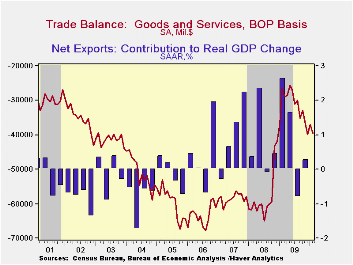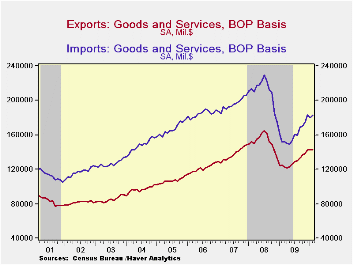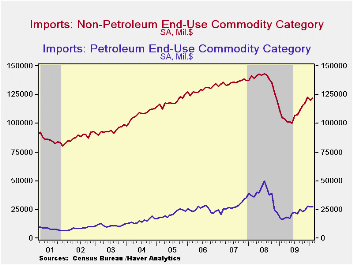 Global| Apr 13 2010
Global| Apr 13 2010U.S. Trade Deficit Deepens Slightly With Rise In Imports
by:Tom Moeller
|in:Economy in Brief
Summary
After falling sharply into last autumn, the U.S. foreign trade deficit has bounced within a narrow range during the last four months. For February, the deficit deepened to $39.7B from a little-revised $37.0B during January. The latest [...]

After falling sharply into last autumn, the U.S. foreign trade deficit has bounced within a narrow range during the last four months. For February, the deficit deepened to $39.7B from a little-revised $37.0B during January. The latest figure was slightly deeper than Consensus expectations for a deficit of $38.5B.
With a 1.7% increase, total imports reversed their January decline. The latest gain reflected a modest 1.6% increase (69.9% y/y) in imports of petroleum products as crude oil prices slipped m/m to $72.92 per barrel. Earlier gains in petroleum prices continued to effect a demand reaction. The quantity of petroleum imports fell 4.8% m/m and 6.7% y/y following declines during the prior three years.
Outside of oil, imports reversed most of their January decline with a 1.3% increase. Moreover, recovery in the U.S. economy has pulled real non-oil imports up 14.1% y/y following a 17.7% decline for all of last year. The increase has been led by imports of automotive vehicles & parts which surged by more-than one half y/y. Real nonauto consumer goods imports reversed their January decline with a 3.2% increase (10.0% y/y). Capital goods imports also recovered by 1.2% m/m and by 14.1% over the last twelve months. Finally, services imports increased a firm 3.3% (9.3% y/y). U.S. travels abroad recovered the January decline with a 1.1% increase (0.2% y/y). Passenger fares fell 1.1% (-6.1% y/y) for the second consecutive monthly drop but "other" transportation charges surged 4.0% (15.0% y/y).
Nominal exports posted a 0.2% uptick (14.3% y/y) and reversed a December slip. Real merchandise exports made up half on their January decline with a 0.8% increase and the 12.1% y/y gain remained near the strongest since early-2008. Real capital goods exports gained 1.2% (14.1% y/y) but auto exports fell for the second consecutive month (+57.0% y/y). Adding to the overall rise in exports was a 3.2% increase (10.0% y/y) in real exports of non-auto consumer goods. Exports of services ticked up just 0.5% but the y/y gain of 9.0% fully reversed the 2009 drop.
By country, the trade deficit with mainland China eased to $16.5B and the deficit is roughly half its peak of $27.9B in October of 2008. Exports to China rose by nearly one-half y/y while imports rose by one-quarter. With Japan, the trade deficit deepened to $4.3B as exports rose 9.8% but imports jumped by one-third. With the European Union, the trade deficit increased to $5.3B as exports fell 4.4% y/y and imports rose 5.3%.


| Foreign Trade | February | January | December | Y/Y | 2009 | 2008 | 2007 |
|---|---|---|---|---|---|---|---|
| U.S. Trade Deficit | $39.7 | $37.0B | $39.9B | $26.5B (2/09) | $378.6B | $695.9B | $701.4B |
| Exports - Goods & Services | 0.2% | -0.2% | 3.4% | 14.3% | -14.9% | 11.2% | 13.2% |
| Imports - Goods & Services | 1.7 | -1.8 | 4.9 | 20.5 | -23.4 | 7.6 | 6.0 |
| Petroleum | 1.6 | -3.6 | 15.1 | 69.9 | -44.1 | 37.0 | 9.4 |
| Nonpetroleum Goods | 1.3 | -1.8 | 3.8 | 16.2 | -21.0 | 1.5 | 4.8 |
Tom Moeller
AuthorMore in Author Profile »Prior to joining Haver Analytics in 2000, Mr. Moeller worked as the Economist at Chancellor Capital Management from 1985 to 1999. There, he developed comprehensive economic forecasts and interpreted economic data for equity and fixed income portfolio managers. Also at Chancellor, Mr. Moeller worked as an equity analyst and was responsible for researching and rating companies in the economically sensitive automobile and housing industries for investment in Chancellor’s equity portfolio. Prior to joining Chancellor, Mr. Moeller was an Economist at Citibank from 1979 to 1984. He also analyzed pricing behavior in the metals industry for the Council on Wage and Price Stability in Washington, D.C. In 1999, Mr. Moeller received the award for most accurate forecast from the Forecasters' Club of New York. From 1990 to 1992 he was President of the New York Association for Business Economists. Mr. Moeller earned an M.B.A. in Finance from Fordham University, where he graduated in 1987. He holds a Bachelor of Arts in Economics from George Washington University.
More Economy in Brief
 Global| Feb 05 2026
Global| Feb 05 2026Charts of the Week: Balanced Policy, Resilient Data and AI Narratives
by:Andrew Cates






